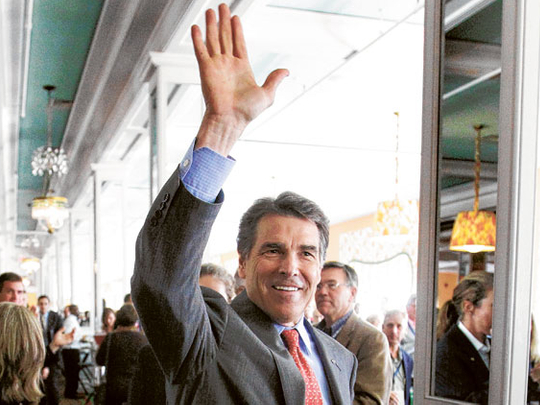
The race to become the Republican presidential candidate hit a new low on Wednesday night when Texas governor Rick Perry politically imploded during a televised debate. The candidates were competing over the number of government departments they would abolish if elected.
Perry jumped in and said that he would cut three: "Commerce, education and... and..." And, for all the tea in China, the poor guy couldn't remember the third. Perry scratched his head and looked at the debate moderators for help. "What's the third one?" he asked. His hosts gave him a little extra time and the governor rifled through his notes.
"I can't find the third," he laughed, with the sheepish grin of a sporty undergraduate who has ‘lost' his term paper yet again. "Oops!" At the end of the evening, the political betting web site intrade.com reported that the chances of this former front runner winning the nomination had fallen to just two per cent. Oops, indeed. The 2012 Republican presidential field is one of the worst in history. The man to beat is Mitt Romney, the former governor of Massachusetts. It shouldn't be a hard task.
Romney has a bad reputation as a flip-flopper. On almost every issue that Republicans care about — health care, abortion, guns — he has changed his position with the political wind. This year he's running as a red-blooded conservative, the kind of guy the powerful right-wing Tea Party movement could go for. But he isn't fooling anyone. The fact that Romney has rarely scored higher than 30 per cent in national polls testifies to Republican unease over his candidacy. Why can't the Tea Party — which so dominates the modern Republican Party — find a viable alternative to Mitt the moderate? Various people have auditioned for the part; all have failed.
The process has descended into a farce. The first conservative to fall was former House speaker Newt Gingrich. A highly respected elder statesman, he comes across as a mean, mean man. The fact that he served divorce papers to his first wife while she was in hospital for cancer treatment didn't go down well with a party that favours ‘family values'. But Gingrich made things worse by telling a pastor in a campaign interview that his numerous affairs and marriages were the result of overwork brought on by loving his country too damn much. It was an instant fail. The second big challenger to Romney was Minnesota congresswoman Michele Bachmann, compared by some to Margaret Thatcher.
Alas, Bachmann's unblinking eyes and tendency to make things up on the spot slowly alienated her supporters. She was eclipsed by Perry, a man with far more political experience but strangely no ability to perform on television. Aside from stumbling through the debates, he gave a speech in New Hampshire in which he seemed slightly dazed.
"I come from a state," he said, "where, ah, they has this little place called the Alamo, and they declared victory or death. You know we're kind of into those slogans, man! It's like: Live Free or Die, Victory or Death! Bring it! Ha, ha, ha." Just when hope seemed lost, the Republican right suddenly gained a voice in former pizza chain CEO Herman Cain.
Painful scrutiny
Cain seemed a gift from God to conservatives: a black non-politician from a poor background in the south. He spoke golden words that made him sound one-part prophet and one-part motivational speaker. "If the people understand it," he cried during Wednesday's debate, "the people will demand it!" Cain ran even or ahead of Romney in polls for two weeks until rumours emerged that two women had filed complaints of sexual harassment against him while he was head of the National Restaurant Association.
The number grew to three, then four. Although none of the allegations have been proved, the preacher now looks sleazy. Blame for the weakness of the Republican field partly lies with the American media circus, which relishes gossip and translates it into fact. The misery of running a campaign under such painful scrutiny has discouraged better conservatives from entering the race. But the bigger share of fault sits with the Tea Party itself.
By setting unreasonable ideological standards for Republicans to adhere to, the Tea Party has injected a tone of maverick extremism into this election. The litmus test for conservative candidates hasn't been experience or competence: it's been philosophical purity. That explains the overnight success of people who pitched themselves perfectly as Tea Party through and through. But it also explains their sudden downfall.
They had no substance, their records were chequered and, in the case of Cain, no one had bothered to examine their background for scandal. They were good conservatives, but not necessarily good candidates. The irony is that the Tea Party's near-domination of the Republican process will probably result in the nomination of a man that the movement broadly dislikes. So long as the American right continues to promote doctrinaire amateurs such as Herman Cain, the super smooth, high-dive flip-flopper Mitt Romney will be the Republican nominee in 2012.
— The Telegraph Group Limited, London 2011








